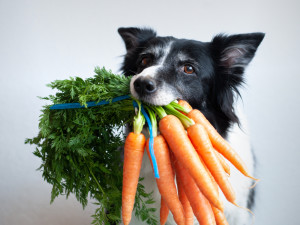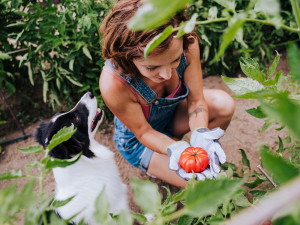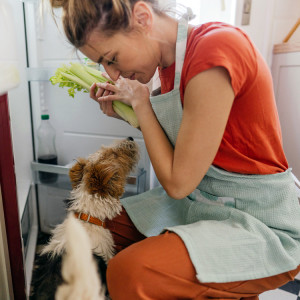Can Dogs Eat Spinach?
They are awfully interested in your smoothie.

Share Article
Spinach is such an amazing superfood that it has inspired everything from popular cartoons to video gamesopens in new tab to celebrity fad diets. The good news is that your dog can eat it, too. Spinach can provide many health benefits to dogs and humans alike. Of course, like many human foods, it is important to feed it in moderation and to focus on feeding your dog a complete and balanced dog food diet primarily. Read on to learn more about sharing spinach with your little Pupeye.
Nutrition facts: Spinach for dogs
Spinach is touted as a superfood because it has many important nutritional benefits. It is a cool weather crop scientifically known as Spinacia oleracea. Spinach grows best when temperatures are more moderate and day length is shorter. The leaves of the plant are edible and may be prepared fresh or cooked in a variety of ways. Spinach is rich in fiber, important vitamins and minerals, and contains potent plant compounds with antioxidant properties. Dogs can benefit from many of these nutrients.
Is spinach good for dogs?
Spinach is good for dogs in moderation as long as they also eat a complete and balanced dog food diet. Some of the benefits dogs may get from eating spinach include:
Fiber: Spinach is rich in insoluble fiber which is an indigestible carbohydrate. It helps to create feelings of fullness without adding calories, adds bulk to the stool, prevents constipation, and supports a healthy gut microbiome.
Vitamins and minerals: Spinach is especially rich in iron, calcium, magnesium and potassium. It also contains vitamins A, K, E, B6, and folate. These are vital nutrients necessary for daily life functions including normal red blood cell function and transport of oxygen, development of healthy bones and teeth, muscle contractions, heart function, nerve conduction, blood clotting, and more. If your pup eats their regular dog food, they are already getting their daily dose of all of these vitamins and minerals, so whatever they get from treats and snacks is an added bonus.Antioxidants: Spinach contains many antioxidant plant compounds that may protect the body against oxidative damage from free radicals. This may help to slow the aging process, reduce inflammation, and protect against certain chronic diseases and some types of cancer.
Can dogs eat any part of the spinach plant?
Yes, technically the entire spinach plant is considered safe and nontoxic to dogs. Because we mostly eat the leaves and stems of the plant, these are the parts your dog will likely encounter. If your dog is exploring in your garden and sampling your plants, you’ll want to keep a close eye, however. While the spinach plant would be safe to snack on, other plants may not be safe to eat and there may be other inedible items in the garden including mulch, rocks, plastic plant markers, or pesticides that are not safe for your dog to eat. Be sure to keep these items out of reach and consider creating a dog-safe section in your yard.

Is spinach completely safe for dogs?
Spinach is safe for dogs as the occasional snack or treat. Dogs can benefit from many of the healthy nutrients in spinach too. If you are planning to share your spinach with your pup, keep a few important points in mind:
High fiber content: Spinach is very high in fiber, which is one of its claims to nutritional fame, but this can also lead to some less desirable effects. Many dogs are not accustomed to eating large quantities of fiber, and too much can cause digestive upset including bloating, gas, vomiting, or diarrhea. It is best to introduce high-fiber foods gradually and start with a very small portion to see how your dog tolerates it.
Beware of other ingredients: Plain, washed, fresh, or steamed spinach is the safest form to share with your pup. Dishes prepared with spinach may contain other ingredients that are not dog-friendly so be sure to double-check all the ingredients before sharing. Spinach is often cooked with garlic, butter, or cream, which can make it unsafe for dogs.
Risk of calcium oxalate crystal formation: Spinach contains oxalates, which are compounds that can form urinary crystals when combined with calcium in the body. For a healthy dog who is just having a small occasional snack of spinach, this is not a concern. However, if your dog has previously had calcium oxalate crystals in their urine or has had bladder or kidney stones, your vet may advise you to avoid feeding any foods that are high in oxalates. like spinach.
Other foods that are safe for dogs
Apples can make for a crunchy and satisfying pup treat.
Peanut butteropens in new tab is also a good choice as long as you check all the ingredients or just make your own.
Pumpkin is another good snack for pups, and chock full of fiber, too.
Other foods that are dangerous for dogs
Garlicopens in new tab, onions, and all plants in the Allium family are considered toxic to dogs.
Chocolate is also a definite no-no.
Corn cobs are not toxic, but they pose serious risks to dogs and should be kept out of reach.
The bottom line: Can dogs eat human food?
Dogs can eat lots of human foods, and it can be fun to prepare a special treat or meal for your pup every now and then. As omnivores, dogs can eat a large variety of both plant and animal-based foods. At the same time, they have their own unique nutritional needs that are different from ours, and not every food that is safe for us is OK to share. Be sure to double check that foods are safe and non-toxic to dogs before offering something new.
As a general guideline, it is best to limit all of these treats and table snacks to less than ten percent of your dog’s overall diet. This ensures that the bulk of their diet comes from a complete and balanced dog food that is specifically tailored to meet their nutritional needs and avoid any serious deficiencies. This also helps to maintain a healthy caloric intake to prevent accidental overfeeding and weight gain.
FAQs:
How much spinach can a dog eat?
A small snack of spinach is safe for dogs, but eating too much at once may cause digestive upset due to the high fiber content.
Is it OK to give dogs spinach?
Yes, spinach is nontoxic and safe for dogs to eat in small amounts.
Why do dogs like spinach?
They may be attracted to the texture or the smell of the leaves.
Is spinach good for dogs?
In moderation, spinach can be good for dogs as long as they primarily eat a complete and balanced dog food diet.
References
Brown, Scott A. “Urolithiasis in Small Animals.” Merck Veterinary Manual, Merck Veterinary Manual, 2 Oct. 2013, www.merckvetmanual.com/urinary-system/noninfectious-diseases-of-the-urinary-system-in-small-animals/urolithiasis-in-small-animals#Struvite-Stones:_v3296104.
Kopp, Kayla. “7 Reasons You Should Eat More Spinach.” Cleveland Clinic, 16 Feb. 2024, health.clevelandclinic.org/benefits-of-spinach.
Mahr, Susan. “Spinach, Spinacia Oleracea.” Wisconsin Horticulture, hort.extension.wisc.edu/articles/spinach-spinacia-oleracea/.
Mitchell, Tanecia, et al. “Dietary Oxalate and Kidney Stone Formation.” American Journal of Physiology-Renal Physiology, vol. 316, no. 3, 1 Mar. 2019, pp. F409–F413, www.ncbi.nlm.nih.gov/pmc/articles/PMC6459305/, https://doi.org/10.1152/ajprenal.00373.2018.

Dr. Amy Fox, DVM
Amy Fox, DVM is a small animal veterinarian in New York City with over thirteen years of experience in a mixture of general practice, emergency medicine, and shelter medicine. A lifelong animal lover, Dr. Fox studied biology in college and then worked as a veterinary nurse before pursuing veterinary school at Cornell University. Her expertise includes surgery, dentistry, and management of chronic conditions, and she is interested in toxicology, pain management, nutrition, care of senior pets, and educational outreach. Dr. Fox also enjoys writing about veterinary medicine and teaching, and her work has previously appeared in Spruce Pets. In her free time, she loves to cook, garden, go for long runs, and hang out with her goofy mixed-breed dog May, who provides never ending comic relief!
Related articles
![A person giving a banana to a dog.]()
10 Fruits and Vegetables That Your Dog Can Feast On
Indulge your pup (safely) with these delicious and healthy snacks.
![Puppy eating a bowl of blueberries]()
10 Superfoods You Should Share With Your New Dog
From kale to quinoa, these nutrient-packed picks deserve a spot in your dog’s food bowl.
Can Dogs Eat Tomatoes?
Bite-size pieces of ripe, red tomatoes are safe—but you should skip the marinara sauce.
Can Dogs Eat Cauliflower?
They want to munch on that crudité platter.
Can Dogs Eat Onions?
Add them to the list of no-nos in the kitchen. Here’s why.
Can Dogs Eat Celery?
Sure, they can have a bite—if they want one.








